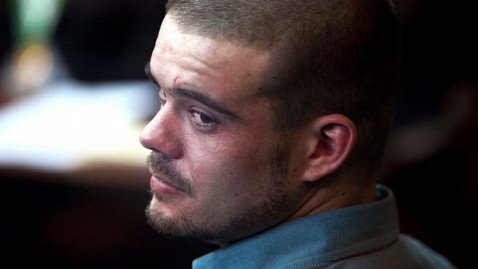Joran Van Der Sloot's Lawyer Says U.S. Extradition Inevitable

Credit: Karel Navarro/AP Photo
ABC News' Joe Goldman in Lima, Peru, reports:
The extradition of Joran van der Sloot to the U.S. on charges of wire fraud and extortion in connection with the death of Natalee Holloway will likely take place this summer, his lawyer told ABC News today.
"The power of the United States will assure that Joran has to face a U.S. judge and I think the extradition will happen probably in two or three months," Maximo Altez said in an exclusve interview with ABC News.
Altez spoke to ABC News after van der Sloot appeared in a jailhouse courtroom at Piedras Gordas prison, about two hours north of Lima.
Peruvian Judge Zenaida Vilca heard arguments by U.S. Justice Department officials pushing for the extradition while Altez opposed the move on grounds his client could not receive a fair trial in a U.S. court.
The Dutch national is currently serving a 28-year sentence for the murder of Stephany Flores, a Peruvian woman whom van der Sloot admitted to strangling in his Lima hotel room two years ago.
He is also the main suspect in thedisappearance of Holloway in 2005 on the Caribbean island of Aruba where van der Sloot had lived most of his life.
Van der Sloot, appearing nervous and thinner than in previous appearances, was marched by prison officials to the courtroom, handcuffed and refusing to answer questions posed by nearby reporters.
The maximum-security jail is in a sparsely populated area of rolling desert-like hills. On one of the mountains overlooking the facility is the slogan Cristo Vive (Christ Lives) in huge white block letters and below are the tents of some very poor squatters.
Altz spoke with ABC News after the court appearance and said van der Sloot was "very upset with the prospect of being extradited to the U.S. I haven't seen Joran so down, so depressed since I took on his defense almost two years ago."
The extortion and wire fraud charges relate to payments allegedly made to van der Sloot by the Holloway family for information on the whereabouts of their daughter's body.
In court U.S. legal officials argued that there is evidence that will show that van der Sloot arranged for and accepted those payments. Altez says that van der Sloot was lured into taking those payments and that it wasn't on his client's initiative.
Although the judge and other Peruvian legal authorities claim van der Sloot will have to return to Peru to finish out his 28-year sentence, Altez thinks differently.
"Once he's in the U.S. there are no guarantees that he would not be charged with Holloway's murder although no such evidence exists," he said.
The next step involves the judge sending her decision to Peru's Supreme Court, expected within the next week to 10 days, and the high court then giving its stamp of approval to the extradition. At that point only government ministers or the president can stop the process, which is highly unlikely according to most observers.
"It's not in our interest that Joran be judged in the U.S. because he is despised there. You could not find an impartial jury to try him," said Altez, who said he will try to stop the extradition "by all legal means possible."
"There's not much you can do when you're up against the most powerful country in the world," he added.